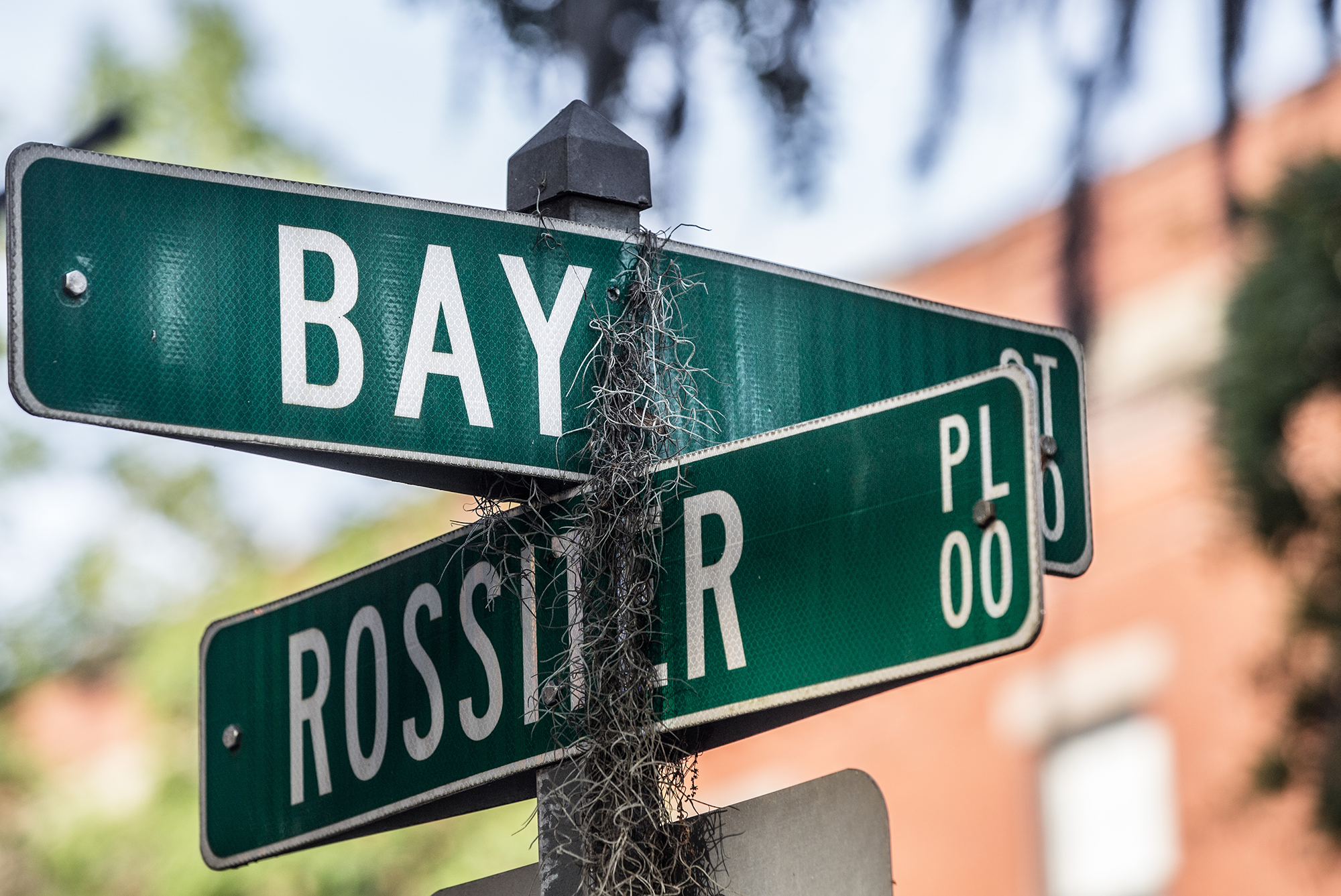
September 2019:
Dr. Frank Rossiter of Savannah
Inducted into Irish America
Hall of Fame
Savannah’s Dr. Francis P. Rossiter, Jr., Inducted
into Irish America Hall of Fame
September 2019 Ceremony in New Ross, County Wexford
New Ross, County Wexford, Ireland: Surrounded by members of his family and a host of friends from both Georgia and Ireland, Dr. Francis Patrick (“Frank”) Rossiter, Jr. — a native of the historically Irish Old Fort neighborhood on Savannah’s east side — was honored at a ceremony on the evening of September 4, 2019. After unanimous endorsements by, first, a committee in Ireland and, second, another committee in New York City, a proposal authored by a group of Rossiter’s admirers was translated into a well-deserved honor, namely, the beloved Savannah figure’s induction into the Irish America Hall of Fame.
Distinguished Army Doctor
Like many of Savannah’s Irish-American males, Dr. Rossiter received his high school education at “B.C.” — that is, Benedictine Military School, formerly Benedictine College, founded in 1902. After completing studies at the third-level Armstrong Junior College, Savannah (now part of Georgia Southern University), he left Chatham County to earn a Bachelor’s degree in Chemistry/Pre-Medicine (Phi Beta Kappa; Phi Kappa Phi) at the University of Georgia in Athens, Georgia.
As the recipient of a prestigious State of Georgia medical scholarship, Rossiter continued his education at the Medical College of Georgia in Augusta, Georgia, resulting in an MD. He elected to become an army doctor, inspired by his father’s patriotic service as the commander of a Landing Ship Tank (LST) during World War II. Deftly manipulating the vessel, which was almost 330 feet (100 meters) long, Francis P. Rossiter, Sr., delivered troops, tanks, and heavy equipment onto the beaches of Normandy on D-Day.
Rossiter, Jr., gained board certifications in Pediatrics and in Allergy & Immunology. His early army service included stints at Brooke Army Medical Center in San Antonio, Texas, and Fitzsimons Army Hospital in Aurora (near Denver), Colorado. Aged just 29, he became Chief of Pediatric Services at Fort Ord, Monterey Bay, California. Four years later, another promotion followed, namely, his appointment as Chief of Pediatrics and Pediatric Allergy Medicine at one of the US Army’s largest community hospitals: Martin Army Community Hospital on Fort Benning, near Columbus, Georgia.
Post-Military Medical Career
After 15 years of active-duty military engagement, latterly at the rank of Colonel, Rossiter returned to Savannah, where he built a private medical practice, in addition to serving on the staff of each of the city’s three teaching hospitals: St. Joseph’s (established by Irish nuns), Candler, and Memorial. Among other roles at Memorial Hospital over the years, he sat on the Ethics Committee, chaired the Medical Advisory Committee, and chaired the Department of Pediatrics (at the unit called Backus Children’s Hospital).
To express gratitude to the State of Georgia for its scholarship support, Rossiter provided 29 years of service as an attending physician in the child and adolescent units of Georgia Regional Hospital Savannah (GRHS), a State hospital for the mentally and developmentally disabled. Its catchment area covers 34 counties in Southeast Georgia.
At the statewide level, the Governor of Georgia appointed Rossiter to the Board of Governors of Georgia’s Department of Community Health. The board’s members play a critical role in ensuring healthcare delivery to around a quarter of Georgia’s population, for the Department constitutes the lead agency overseeing both Medicaid and the State Health Benefit Plan. It also regulates healthcare facilities operating in Georgia.
Rossiter’s passion for the military has never waned. In Savannah, while operating his professional practice, he provided 20 years of leadership as Commanding Officer of the Savannah Medical Detachment of the Georgia Army National Guard, gaining the rank of Brigadier General. As its president and in other roles, he also supported the Chatham Artillery Association, an organization dedicated to preserving the history and advancing the welfare of one of the US’s oldest military units: the Chatham Artillery (“Savannah’s Own”), founded by Patriots in 1776, the second year of the Revolutionary War.
Since his retirement in 2003, Rossiter has continued to advance healthcare in Savannah and its hinterland. Many examples could be adduced, but of special note is his chairing of the Chatham County Hospital Authority to negotiate the $456.6 million deal whereby Memorial, employer of around 4,700 people, became, in February 2018, a partner institution within the Hospital Corporation of America. The citation for the Irish America Hall of Fame induction underscored Rossiter’s insistence that the deal include an indigent-care trust fund (with a $25 million starter deposit) so Memorial could boost — not merely maintain — its historic dedication to the region’s neediest residents.

Quintessential Irish American
Above • As its Grand Marshal, Dr. Rossiter leads the 2008 St. Patrick’s Day Parade in Savannah. His elder son, Trey, follows, fulfilling the role of a Marshal’s Aide. (Image courtesy of Savannah Morning News.)
Frequently, the award citation invoked Dr. Frank Rossiter’s stalwart service to Savannah’s rich Irish traditions. Several contributors to the nominating document pointed to the fact that his unanimous election as Grand Marshal of the city’s 2008 St. Patrick’s Day Parade (the 184th) saw record participation from those entitled to cast a ballot. Frank’s father had been honored with the Grand Marshal’s sash in 1972, and both Rossiters also rose to another significant position within Irish Savannah: the presidency of the Hibernian Society of Savannah, chartered in 1812 to “tender the aid of a delicate charity” to “distressed” Irish immigrants then entering the so-called Hostess City. Rossiter Senior’s yearlong term began on St. Patrick’s Day 1974; Rossiter Junior’s on that festival in 1998.
Rossiter’s Irish patrimony also informs his fiscal-affairs (and other) service to the Roman Catholic Cathedral of St. John the Baptist in Savannah’s Historic District — and to the larger Diocese of Savannah. His paternal great-grandparents, Patrick Rossiter and Anne Corrigan, both natives of County Wexford, Ireland, were married (on April 17, 1865) in the Cathedral by another Wexford immigrant, Father Peter Whelan. This strong geographic connection informed the decision to conduct the Hall of Fame ceremony at the Dunbrody Emigration Experience Center in New Ross, County Wexford, as opposed to New York City (the other site used for inductions).
A Family that Serves
Dr. Rossiter’s can-do character comes honest! In 1869, the immigrant Patrick Rossiter petitioned a Savannah court to formally incorporate the Irish-dominated Workingmen’s Benevolent Association, a group that he had cofounded to improve labor conditions and rights. With an equivalent African-American entity, it created six-man, mixed-race teams as the work model for Savannah’s longshoremen, an arrangement unique among Southern ports of the period.
Breath of vision is also manifest in subsequent generations of the Savannah Rossiters. In addition to distinguished World War II service, Patrick’s grandson, Frank Rossiter, Sr., so endeared himself to Savannah as a journalist that readers of the Savannah Morning News began the day on the newspaper’s back page, site of the Rossiter-authored column City Beat.
Across the final 13 years of his life, Frank Rossiter, Sr., prosecuted a political career — specifically, multiple consecutive terms as Mayor Pro Tem (i.e. deputy mayor) of Savannah. Invariably, he secured the highest vote tallies in citywide races. Upon his passing, Savannah renamed a Historic District street in his honor: Rossiter Place, which loops around Emmet Park (formerly Irish Green), overlooking the Savannah River.
In his own right, Dr. Francis P. Rossiter, Jr., has contributed exceptionally to civic life, healthcare, the military, and Irish heritage in and beyond Savannah and Georgia. Unerringly modest, he seeks — with with exemplary integrity, reliability, and effectiveness — to promote the wellbeing of others before that of self. The Center for Irish Research and Teaching at Georgia Southern University is proud to count him as one of its foremost advocates, and everyone associated with Eagle Nation congratulates him on his induction into the Irish America Hall of Fame.

An Achievement for Savannah
On the right of the image, Dr. Francis P. Rossiter, Jr., receives the Waterford Crystal plate that acknowledges his induction into the Irish America Hall of Fame, an honor originating with the New York City-based Irish America magazine. The physical Hall of Fame is located at the Dunbrody Emigration Experience Center in New Ross, County Wexford, Ireland, near the ancestral homestead of John F. Kennedy, 35th President of the United States.
Next to Rossiter, presenting the award (on September 4, 2019), is Walter O’Leary, Chair of the John F. Kennedy Trust, which operates both the Dunbrody Center and the Kennedy Homestead. Also in the front row are the Trust’s CEO, Seán Connick, and Rossiter’s wife, Glenda. John and Trey Rossiter, the awardee’s sons, feature in the back row.
The Irish America Hall of Fame began in 2010, with the inaugural honor going to Donald R. Keough, sometime Chair and CEO of the Atlanta-based Coca Cola corporation. In addition to Dr. Frank Rossiter, the September 2019 ceremony in New Ross also saw the induction of John McShane, a son of Philadelphia, who developed a consequential construction company in Washington, DC, responsible for many large-scale edifices, from the Pentagon to the Jefferson Memorial to the Kennedy Center.
McShane’s award was posthumous. Many members of his family traveled from the States for the event, as did natives of his ancestral county, Donegal (northwest Ireland). County Kerry, Ireland, was also well represented, for McShane’s philanthropy was critical to the development of Kilarney National Park, a jewel within that county.




